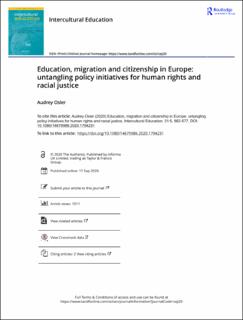Education, migration and citizenship in Europe: untangling policy initiatives for human rights and racial justice
Peer reviewed, Journal article
Published version

View/
Date
2020Metadata
Show full item recordCollections
Original version
Osler, A. (2020). Education, migration and citizenship in Europe: untangling policy initiatives for human rights and racial justice. Intercultural Education, 31(5), 562-577. https://doi.org/10.1080/14675986.2020.1794231Abstract
The 21st century has seen changes in migration patterns in Europe with implications for schooling and civic education: movement from eastern and central European Union member states to western Europe; increased movement between member states for study or work; and growth in the numbers of migrants and refugees seeking asylum in Europe as a result of regional conflicts and global inequalities. This article reviews European standards and policy frameworks on education and migration and considers whether they translate into policy and practice at national and sub-national levels. It identifies tensions between European standard-setting in the field of human rights and democracy, and the responsibilities of national governments in the field of migration and education, specifically education for citizenship. While European rhetoric emphasises democracy and human rights, national education policies stress language acquisition and national values in the integration of newcomers. Less attention is given to educating mainstream populations in human rights and social justice, or in enabling students to recognise and critically examine populist and anti-democratic discourses. National and European education policies that purportedly promote justice may fail to realise inclusive and cohesive citizenship if they acknowledge changing demographics but neglect everyday injustices and European histories of racialisation and racism.
